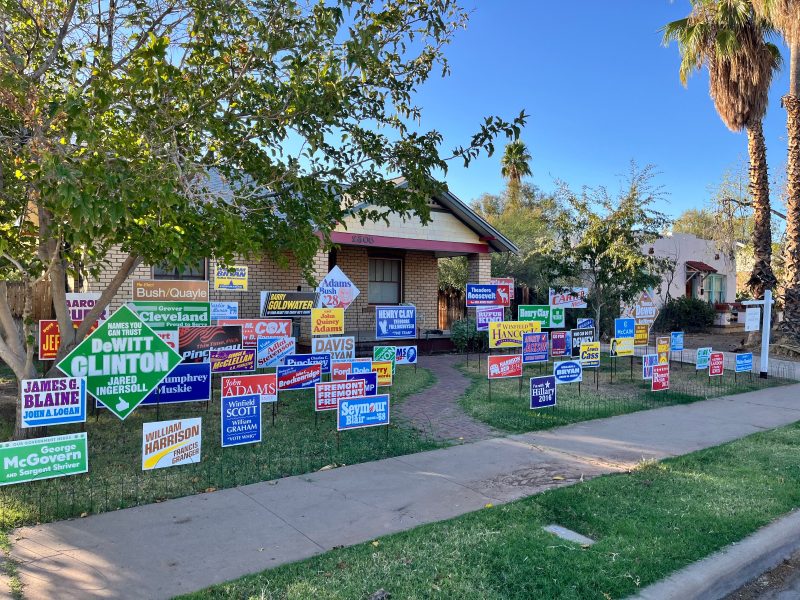
This campaign sign graveyard is bringing election losers back from the dead
A presidential election season lawn pocked with Thomas Dewey, Barry Goldwater and Aaron Burr signs might seem like some sort of prank. Barbara VanDenburgh had never seen anything quite like the display in her Central Phoenix neighborhood, so she took some photos and posted the exhibit on X.
The “graveyard to failed American presidential campaigns,” as VanDenburgh called it, is actually an art installation that makes the rounds across the country every four years, much to the delight of onlookers who enjoy the trip down memory lane.
“I think maybe if I had thought about it a little more deeply, I could have realized it was part of a bigger project,” VanDenburgh, 42, told The Washington Post. “But, I thought the person was just a really glorious, strange individual who had collected all these yard signs.”
The piece, titled “Monument to the Unelected,” has become a presidential election cycle tradition by artist Nina Katchadourian since it was first commissioned by the Scottsdale Museum of Contemporary Art in 2008. The display has landed in many places over the years, from gracing the walls of Catharine Clark Gallery in San Francisco in 2020 to decorating the windows of The Washington Post’s headquarters at the time in 2012.
The signs attract “quite a few” visitors, said Carrie Tovar, a Phoenix resident who previously hosted the display and was delighted to have the signs on her front lawn again this year.
“People are so interested in looking at each of the signs, perhaps reminiscing about elections they remember participating in, and then learning so much about American history as well,” Tovar told The Post. “We love it because it is truly factual and part of our history as a country. Yet, it is also funny, and whimsical, and colorful.”
Katchadourian said she didn’t expect “Monument to the Unelected” to be a piece she would show again after the 2008 election, but it’s now something she looks forward to every four years.
Fifty-nine losing candidates are represented this year, from John Adams to Donald Trump, and Katchadourian will add a 60th sign to the piece reflecting the loser of the Nov. 5 election.
Despite the politics behind the signs, Katchadourian says the piece is “apolitical” and essentially just a series of facts. Each sign has the year of a U.S. presidential election and the candidate who lost. However, Katchadourian said, the signs are not exact copies of the candidates’ branding, especially the older ones, so every sign has a more modern appearance. She prints the signs on Coroplast at a commercial printer for an authentic look.
“I would say that the tenser the atmosphere around the election, the more people have sort of encountered the piece and tried to really read it for a certain viewpoint,” she said.
Katchadourian said she likes that the piece is open to interpretation and that its message continues to be relevant 15 years after she first put it on display.
“It might initially look like a prank,” she said. “But it’s actually talking about something that I think we all have a lot at stake in. Who we elect to office is a big deal.”
